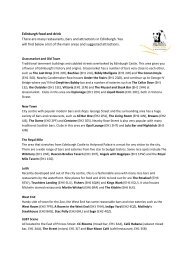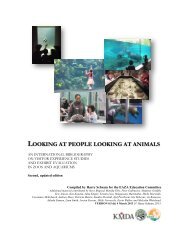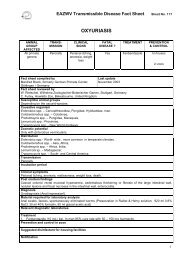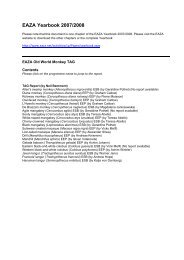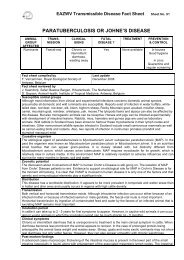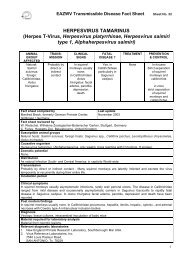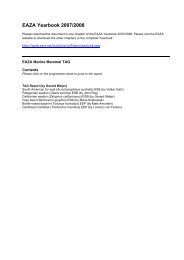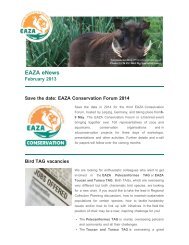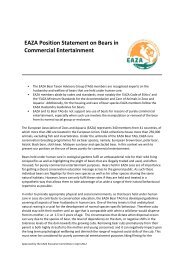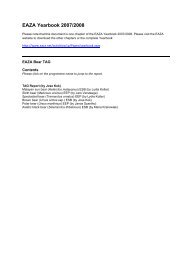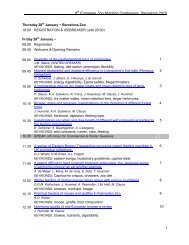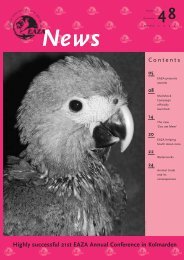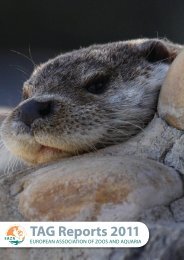Leipzig Zoo - European Association of Zoos and Aquaria
Leipzig Zoo - European Association of Zoos and Aquaria
Leipzig Zoo - European Association of Zoos and Aquaria
Create successful ePaper yourself
Turn your PDF publications into a flip-book with our unique Google optimized e-Paper software.
Poster:<br />
Faeces consistency in captive tapirs<br />
S. Lang 1 , E.P. Medici 2 J. Fritz 1 , J.-M. Hatt 3 J. Hummel 1,4 , M. Clauss 1<br />
1 Institute <strong>of</strong> Physiology, Physiological Chemistry <strong>and</strong> Animal Nutrition, Munich, Germany, 2 IPÊ -<br />
Institute for Ecological Research, São Paulo, Brazil, 3 Department <strong>of</strong> <strong>Zoo</strong> Animals <strong>and</strong> Exotic Pets,<br />
Zurich, Switzerl<strong>and</strong>, 4 <strong>Zoo</strong>logical Garden <strong>of</strong> Cologne, Germany<br />
The consistency <strong>of</strong> the faeces is one <strong>of</strong> the few medical parameters that is monitored in every zoo as a<br />
daily routine. Changes in faecal consistency are an early sign <strong>of</strong> digestive upset, <strong>and</strong> are <strong>of</strong>ten the first<br />
observation reported by animal keepers to the veterinary staff as an indication <strong>of</strong> a potential medical<br />
problem.<br />
In captive tapirs, the assessment <strong>of</strong> faecal consistency is <strong>of</strong>ten prevented by the fact that these animals<br />
prefer to defecate in a water basin, which they have at their disposal in many facilities. However, we<br />
also experienced that the conception <strong>of</strong> “normal” tapir faeces differs widely between facilities.<br />
Therefore, we photographed tapir faeces from several facilities <strong>and</strong> from free-ranging lowl<strong>and</strong> tapirs.<br />
Additionally, the particle size distribution in tapir faeces from captivity <strong>and</strong> from the wild was<br />
investigated by wet sieving.<br />
With one exception, captive tapirs generally had faeces <strong>of</strong> a cow pie-consistency, with little indication<br />
<strong>of</strong> formed pieces. In contrast, faeces <strong>of</strong> free-ranging tapirs consisted <strong>of</strong> small, compact, formed balls.<br />
Only the faeces <strong>of</strong> one captive tapir, fed a very high proportion <strong>of</strong> roughage, resembled those <strong>of</strong> the<br />
free-ranging animals. These observations alone indicate that a higher proportion <strong>of</strong> concentrate (nonroughage)<br />
feeds in captive tapirs leads to s<strong>of</strong>ter, less formed faeces. Therefore, one would expect<br />
smaller faecal particles in captive tapirs as a reflection <strong>of</strong> the lesser proportion <strong>of</strong> roughage in their<br />
diets. In contrast, faecal particle size was generally higher in captive tapirs.<br />
The results suggest that on the one h<strong>and</strong>, captive tapirs make little use <strong>of</strong> <strong>of</strong>fered roughage (grass or<br />
lucerne hay), with the result <strong>of</strong> s<strong>of</strong>t faeces. However, the roughage portion that they do ingest is<br />
masticated into larger particles than the forage they ingest in the wild. This could be an indication that<br />
the dentition <strong>of</strong> tapirs, which is different from that <strong>of</strong> other perissodactyla, is poorly suited for the<br />
mastication <strong>of</strong> hay forages <strong>and</strong> might therefore be the reason for the low acceptance <strong>of</strong> these forages<br />
observed in captive animals.<br />
Author’s address:<br />
Stefanie Lang & Marcus Clauss<br />
Institute <strong>of</strong> Animal Physiology, Physiological Chemistry <strong>and</strong> Animal Nutrition<br />
Schönleutnerstr. 8<br />
85764 Oberschleissheim<br />
Germany<br />
clauss@tiph.vetmed.uni-muenchen.de<br />
-click here to go back to the index-



